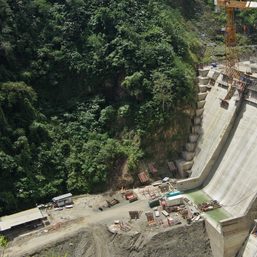SUMMARY
This is AI generated summarization, which may have errors. For context, always refer to the full article.
![[OPINION] Kaliwa Dam and climate justice](https://www.rappler.com/tachyon/2023/11/Screenshot-2023-11-26-at-2.22.50-PM.png)
On October 17, Climate Rights International (CRI) and Manila Observatory (MO) sent a letter to President Marcos Jr. through the Department of Environment and Natural Resources asking the President to halt the construction of the Kaliwa Dam until further investigation is made on the consequences of constructing such dam.
While we understand the need to augment the water supply of Metro Manila, especially since climate change will mean longer instances of droughts and the unpredictability of rainfall throughout the year, we believe that there are plenty of viable alternatives that will not include the destruction of the Sierra Madre mountain range, one of our last shields against typhoons coming in from the Pacific. It is imperative that the country, in creating socioeconomic policies, ensures that no one is left behind – this includes indigenous peoples and upland rural communities, not just those living in the urban centers.
The letter that CRI and MO sent the President mentioned two main concerns that would result from the construction and use of such dam, which, unless suspended, will be fully operational by 2027. These concerns are human rights as well as climate change and environment concerns. They will be discussed further below.
Human rights
The construction of the dam will have significant adverse impacts on the lives and livelihoods of the Dumagat-Remontado indigenous peoples as well as the local community. Primarily reliant on agriculture and tourism (given Mt. Daraitan and Tinipak river’s proximity to Manila), the dam’s construction will likely lead to a steep decline in living standards and increase in poverty levels.
There have as well been widely documented reports of irregularities and inadequate compliance with regard tocompensation (dubbed “disturbance fees”) as well as the conduct by the National Commission on Indigenous Peoples (NCIP) or the Free, Prior, and Informed Consent (FPIC) Process that is required under the law prior to any development project in indigenous land. An essential component, for instance, of any development project, is the conduct of a public hearing, which residents of Brgy. Daraitanin Tanay said was not held. It is also required that the residents are told of the consequences of the project in a language that is understandable to them, which again the residents claim was not done. In fact, it was noted by residents that the Environmental Management Bureau (EMB), who explained the project, did not present documents in the local language and, more importantly, failed to explain that the area on which they live would be submerged as a consequence ofthe dam’s construction and eventual operation.
Finally, the Tinipak River, famed for its limestone formations and pristine waters, is central to the spiritual lives of the Dumagat-Remontado, who believe that the water is sacred. Therefore, the construction of the dam “represents and irreversible and irreplaceable loss of heritage and culture” to the indigenous group.
Climate change and environment concerns
The Kaliwa Dam is posed to be operational within the Kaliwa Watershed Reserve, proclaimed as such by then President Ferdinand Marcos Sr. through Proclamation No. 573 in 1968. Eventually, part of the watershed was created into a National Park and Wildlife Sanctuary, which makes the dam’s construction and operation an Environmentally Critical Project (ECP) that could potentially result in massive and irreversible damage.
The Sierra Madre mountain range, where the dam is being constructed, is already in a fragile state because of the amount of deforestation that has been done on it over the past few decades. It will be made even more vulnerable with the deforestation that will necessarily accompany the dam’s construction – it is “expected that the dam’s reservoir that will be created as part of the dam’s operations will submerge 93 hectares of forestland” and the construction of infrastructure as well as roads will also impact thousands of hectares of residual forests in the watershed area.
Moreover, the construction of the dam will lead to more risks of typhoons, landslides, and flooding, not just to the areas that will be directly impacted by the dam’s construction, but low-lying areas as well, including Metro Manila and the Rizal and Quezon Provinces. This could also lead to the destruction of areas that are crucial to farming as well as wildlands.
Lastly, it is expected that the dam’s construction will harm the ecosystem and the biodiversity of the Sierra Madre mountain range, which houses hundreds of flora and fauna, some of which are endangered and endemic to the area.
The Philippines’ obligations
The Philippines is signatory to several treaties that we believe should be highly considered even before the planning and the construction of the Kaliwa Dam and similarly-situated projects. This includes the Paris Agreement under the United Nations Framework Convention on Climate Change as well as the United Nations Declaration on the Rights of Indigenous Peoples.
The Kaliwa Dam is but one of the many projects that the Philippine government has. In its journey towards economic growth, it should not put into place policies that will enable it to backslide on its commitments to place the environment and the country’s resilience and ability to adapt to the challenges of climate change at a high priority, especially considering how vulnerable we are to the effects of an increasingly warming world.
As we all travel this week to Dubai for the 28th Conference of the Parties of the United Nations Framework Convention on Climate Change, we believe that the Philippines has a very unique and important opportunity to be a leader in ensuring that development does not have to mean sacrificing human rights or ecological health, and that a development that does not take into consideration those who have historically been in the margins is not development at all. This is why we strongly believe that the Kaliwa Dam construction should be suspended until further investigations are conducted. – Rappler.com
Tony La Viña teaches constitutional law at the University of the Philippines and several Mindanao law schools. He is former dean of the Ateneo School of Government.
Joy Reyes is a climate justice lawyer affiliated with the Manila Observatory and the Legal Rights and Natural Resources Center.
Add a comment
How does this make you feel?
![[OPINION] Why should the construction of Kaliwa Dam be stopped?](https://www.rappler.com/tachyon/2021/01/Kaliwa-Dam-ispeak.jpg?fit=449%2C449)
![[OPINION] Last stand in the Sierra Madre](https://www.rappler.com/tachyon/2020/11/TL-Sierra-Madre-November-18-2020.jpg?fit=449%2C449)




There are no comments yet. Add your comment to start the conversation.